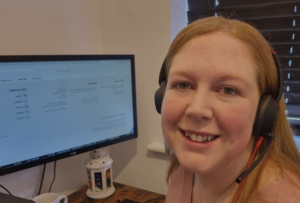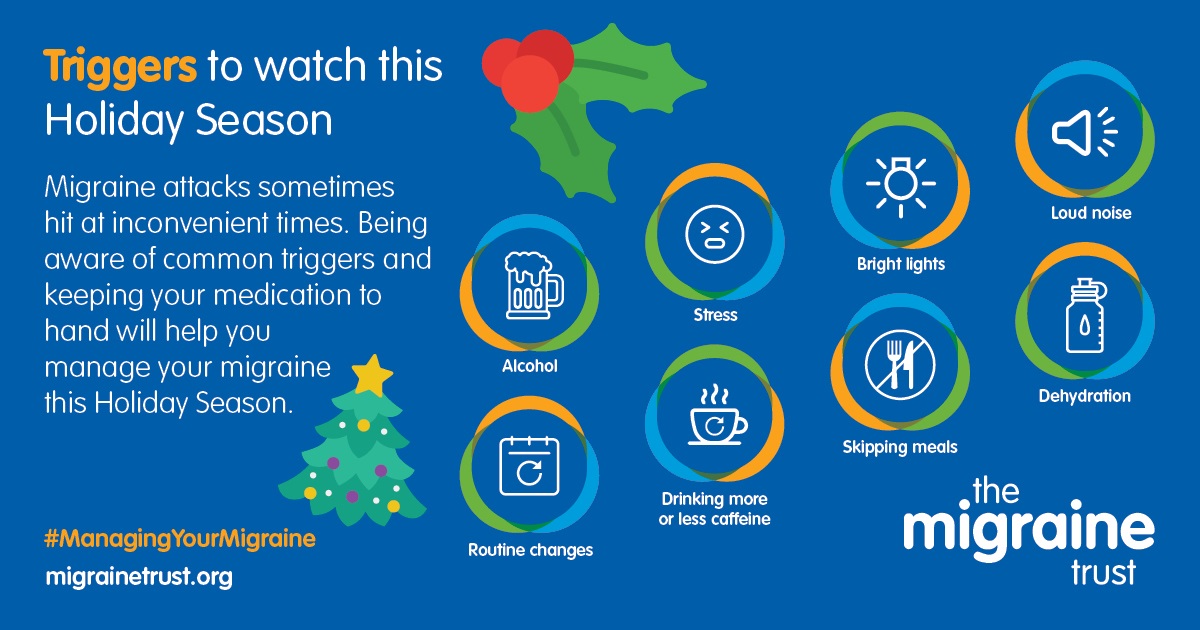Tips to manage your migraine this holiday season
By: Steph Weatherley, Information & Support Services Advisor at The Migraine Trust, and Rachel Baxter, Communication Officer at The Migraine Trust
The winter holiday season is an exciting and enjoyable time for many of us, but for those of us with migraine it can be quite stressful. Many of the things that make winter festivities fun can also trigger migraine attacks, whether it’s a cup of mulled wine, a New Year’s Eve firework display, or a lazy morning in bed.
Below you’ll find top tips for managing your migraine over the holidays from Steph Weatherley, our Information and Support Services Advisor, as well as some more in-depth information about winter migraine triggers and how to deal with them.
Top tips to manage migraine this holiday season
From Steph Weatherley, our Information and Support Services Advisor

This winter season is a time of festivities, family and socialising, however those with migraine will find that Christmas is a classic time for migraine to strike. It’s a good idea to plan ahead and to follow some basic guidelines to minimise the risk of a migraine attack but to still enjoy spending time with loved ones during this festive period.
Alcohol – Many people with migraine find alcohol can trigger migraine; it doesn’t have to be a large amount of alcohol to have this effect.
Food – Foods to be eaten in moderation may include soft cheeses, red wine, processed meats, chocolate and caffeine. Also, remember that skipping meals can contribute to a migraine attack – eating little and often can be helpful.
Sleep – Try to keep to your regular sleep pattern, not getting enough sleep or having too much sleep can trigger a migraine.
Stress – To reduce the stress around Christmas start buying gifts early, avoid loud and crowded shopping centres. Try to take some time out to recentre yourself, deep breathing or mindfulness exercises can also help to minimise the impact of stress.
Lights – Bright and flickering lights are one of the main migraine triggers. Where possible minimise decorations and have static warm lights and not flashing ones. If visiting friends/family, ask for decoration lights to be switched off to reduce the impact on your migraine.
Scents – Strong smells can also be a trigger and Christmas is the time for scented candles. If you are sensitive to strong smells remove any scented candles and decorations. Opt for natural scents and spices instead such as oranges, lemons and cinnamon.
Visiting – Pack an emergency kit to take with you when visiting friends and family. Pack any medications, pain relief, ice packs, ear plugs and any items you find helpful in managing migraine.
If you have questions or concerns about your migraine, you can contact Steph and the team via our free helpline on 0808 802 0066 or email us at info@migrainetrust.org

More about common winter migraine triggers
People with migraine shouldn’t have to deal with extra anxiety or pain during their winter break, which is why we’ve put together a list of potential migraine triggers you might encounter this December, and ways to manage them.
Changes to your routine
We know that the migraine brain doesn’t like change, and keeping a regular routine helps many people manage their attacks. It’s best to go to bed and wake up at the same times each day, stick to regular meal times, and regulate your caffeine intake. Of course, during the holidays, our routines often get thrown into disarray. You might have more late nights, lie in and skip your morning coffee, or find your eating patterns change.
To avoid a migraine attack, it’s worth sticking to your regular routine as much as possible. If you normally get up at 8am and have a coffee at 9am, try to set your alarm and maintain this routine if you can. It’s also important to maintain your blood sugar levels – if you normally skip lunch on Christmas day in preparation for a big evening meal, try to eat something small when you normally would at lunchtime just to keep your blood sugar levels steady.
We all know it’s difficult to keep a perfect routine at such a busy, sociable time, so make sure you’ve got your rescue medication, like triptans or pain relief, to hand. If you’re running low on your medication, be sure to request a new prescription in plenty of time before Christmas as it might be harder to get a doctor’s appointment over the holidays. If you’re going out for the day, make sure to take your medication and a bottle of water with you.
Alcohol
With Christmas parties, family celebrations and meals out, there are many opportunities for a drink over the holidays, but for those of us with migraine this can be stressful. You might feel pressured by others to drink a lot when you know it might trigger an attack for you, or it might be hard to resist a nice cup of mulled wine even though you would normally avoid red wine.
If you know alcohol is a trigger for you, try to drink within your limits and drink plenty of water as you drink to stay hydrated. Some people are only triggered by certain drinks like wine, so if that’s the case for you, pick a drink that you’re less likely to react to. It can also be helpful to explain to the people you’re with that you have migraine and it’s triggered by alcohol, so they don’t pressure you into drinking more than you feel comfortable with.
Certain foods
The role foods play in migraine is often debated, as it’s thought that people with migraine sometimes crave certain foods at the very start of a migraine attack, know as the prodrome or warning stage. For example, you might crave sugar and eat lots of chocolate before your main symptoms like head pain develop. It’s then easy to assume that chocolate is the culprit when it’s not.
However, if you feel that certain foods are triggers for you, it’s best to eat them in moderation. Common foods to not over-indulge in include processed meats, soft cheeses, and foods and drinks containing caffeine like chocolate, Coca-Cola, energy drinks and coffee.
Dehydration
It can be easy to forget to drink water when you’re celebrating with friends and family, out shopping for the day, or busy in the kitchen. Aim to drink two litres of water a day, which is about eight cups, on top of other drinks like tea or sodas. If you’re going out, take a bottle of water with you to sip throughout the day.
Stress
Stress is a common migraine trigger and even feeling excited can trigger an attack. Even though the holidays are often busy, try to carve some time out just for you. You could do some yoga, mindfulness exercises or get a massage. You can also take steps to avoid really stressful situations; you could stick to shopping online or through catalogues this year rather than doing your Christmas shopping in a crowded, noisy shopping centre. If you do go out, plan your shopping trip in advance and only do a few hours at a time. Take regular breaks and remember to eat and stay hydrated.
Sounds and smells
The holidays can be an assault on our senses, whether its intense Christmassy scented candles, loud music, or younger family members making a lot of noise. If strong smells can trigger your migraine, try to avoid buying anything with strong artificial scents and stick to natural ones instead, like oranges and lemons. Avoid being around cigarette smoke if you can too.
If loud noises trigger your attacks, try to take some quiet time to yourself. If you’re at a noisy family gathering, sit in another room for a few minutes and rest your ears. Try to avoid very loud music and watch fireworks from a significant distance if loud sounds tend to affect you.
Bright lights
If flickering, bright lights trigger your migraine, avoid decorating your house with bright, flashing decorations. Use warm lights that don’t flash where possible and turn off anything that makes you feel unwell.
Weather changes
We know that weather changes can trigger migraine for some people due to changes in air pressure. Keep an eye on the weather forecast and if any sudden weather changes like storms, snow or significant temperature changes are headed your way be sure to keep your migraine medication close by. If you can, try to stay at home and take it easy that day.
Colds and flu
Some people find that viruses like the common cold and flu can intensify their headaches and migraine attacks. Headache is also a common symptom of Covid-19, so be sure to wear a face mask on public transport and in busy enclosed spaces, and maintain social distancing where possible. Wash your hands regularly and take hand sanitiser with you if you’re out for the day. These steps will help you avoid all sorts of nasty winter bugs in addition to Covid-19. If you feel unwell, rest at home and make sure you take a Covid-19 test. See the latest government advice here.
Keep a diary
Working out what your migraine triggers are can be tricky, but keeping a diary can help. Make a note of things like your symptoms, how well you’ve slept, what you’ve been eating and drinking, and whether you’ve been at work that day. You can then take your headache diary with you to your doctor’s appointment and they’ll help your work out what’s triggering your attacks. Download our free headache diary template here.
We hope these tips are helpful and wish all our supporters, followers and partners a wonderful holiday season!


